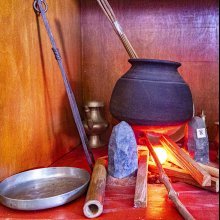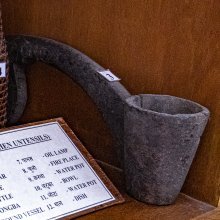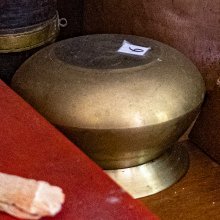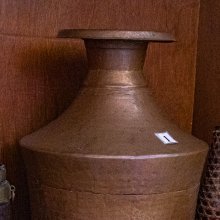Bhanda, Bhāṇḍa, Bhaṇḍa, Bhamda, Bhandā: 28 definitions
Introduction:
Bhanda means something in Buddhism, Pali, Hinduism, Sanskrit, the history of ancient India, Marathi, Jainism, Prakrit, Hindi, biology. If you want to know the exact meaning, history, etymology or English translation of this term then check out the descriptions on this page. Add your comment or reference to a book if you want to contribute to this summary article.
Images (photo gallery)
(+28 more images available)
In Hinduism
Natyashastra (theatrics and dramaturgy)
Source: Wisdom Library: Nāṭya-śāstraBhāṇḍa (भाण्ड) refers to “drums” (muraja) according to the Nāṭyaśāstra chapter 33. Accordingly, “Vajrekṣaṇa, Śaṅkukarṇa and Mahāgrāmaṇī are said to be gods of Murajas (drums). Mṛdaṅgas are so called because of being made of mṛt (earth), and they are called Bhāṇḍas because they bhramayati (move about). Murajas are so called because they are placed in an upright position (ūrdhvakaraṇa), and they are called Ātodya because of relating to todanā (striking).”.

Natyashastra (नाट्यशास्त्र, nāṭyaśāstra) refers to both the ancient Indian tradition (shastra) of performing arts, (natya—theatrics, drama, dance, music), as well as the name of a Sanskrit work dealing with these subjects. It also teaches the rules for composing Dramatic plays (nataka), construction and performance of Theater, and Poetic works (kavya).
Jyotisha (astronomy and astrology)
Source: Wisdom Library: Brihat Samhita by VarahamihiraBhāṇḍa (भाण्ड) refers to “utensils”, according to the Bṛhatsaṃhitā (chapter 10), an encyclopedic Sanskrit work written by Varāhamihira mainly focusing on the science of ancient Indian astronomy astronomy (Jyotiṣa).—Accordingly, “If the course of Saturn (śanaiścara) should lie through the constellation of Hasta, barbers, mill-men, thieves, physicians, weavers, elephant keepers, prostitutes, the Kośalas and garland makers will suffer. If the course of Saturn should lie through the constellation of Citrā, women, writers, painters, various utensils [i.e., citra-bhāṇḍa] will suffer; if through Svāti, the people of Magadha, reporters, messengers, charioteers, sailors, dancers and the like will suffer miseries”.

Jyotisha (ज्योतिष, jyotiṣa or jyotish) refers to ‘astronomy’ or “Vedic astrology” and represents the fifth of the six Vedangas (additional sciences to be studied along with the Vedas). Jyotisha concerns itself with the study and prediction of the movements of celestial bodies, in order to calculate the auspicious time for rituals and ceremonies.
Ganitashastra (Mathematics and Algebra)
Source: archive.org: Hindu MathematicsBhāṇḍa (भाण्ड) refers to “commodity” and represents one of the twenty operations (logistics) of pāṭīgaṇita (“science of calculation which requires the use of writing material—the board”), according to Pṛthudakasvāmī’s commentary on the Brāhmasphuṭasiddhānta by Brahmagupta, a Sanskrit treatise on ancient Indian mathematics (gaṇita-śāstra) and astronomy from the 7th century.—The Hindu name for barter is bhāṇḍa-pratibhāṇḍa (“commodity for commodity”). All the Hindu works on pāṭīgaṇita contain problems relating to the exchange of commodities. It is pointed out in these works that problems on barter are cases of compound proportion, and can be solved by the Rule of Five, etc.

Ganitashastra (शिल्पशास्त्र, gaṇitaśāstra) refers to the ancient Indian science of mathematics, algebra, number theory, arithmetic, etc. Closely allied with astronomy, both were commonly taught and studied in universities, even since the 1st millennium BCE. Ganita-shastra also includes ritualistic math-books such as the Shulba-sutras.
Yoga (school of philosophy)
Source: ORA: Amanaska (king of all yogas): A Critical Edition and Annotated Translation by Jason BirchBhāṇḍa (भाण्ड) refers to a “bowl (of liquid)”, according to the Amanaska Yoga treatise dealing with meditation, absorption, yogic powers and liberation.—Accordingly, as Īśvara says to Vāmadeva: “[...] At the very moment the highest reality manifests itself, [the Yogin] becomes absorbed in that [reality] which even the guru is not able to define [by saying], ‘this is it’. [The Yogin] should carefully avoid disturbances of speech, mind and body and should always hold himself very steady, like [one holds] a bowl of liquid (rasa-bhāṇḍa). [...]”.

Yoga is originally considered a branch of Hindu philosophy (astika), but both ancient and modern Yoga combine the physical, mental and spiritual. Yoga teaches various physical techniques also known as āsanas (postures), used for various purposes (eg., meditation, contemplation, relaxation).
Ayurveda (science of life)
Rasashastra (Alchemy and Herbo-Mineral preparations)
Source: History of Science in South Asia: Making Gems in Indian Alchemical LiteratureBhāṇḍa (भाण्ड) refers to a “vessel”, according to the Vādakhaṇḍa section of the Rasaratnākara (lit. “jewel mine of mercury”): a 13th century alchemical work in Sanskrit written by Nityanātha.—Accordingly, while describing the recipe for Matsyakajjala (“fish black”): “Rub lac with four times its amount of water; take 4,8 litres of this liquid, filtered through a cloth, and boil it in an earthen vessel (mṛd-bhāṇḍa) [mṛdbhāṇḍagaṃ pacet] on low heat, until a fourth of it remains. Add 48 g each of powdered Natron, Borax, and Lodhra. Heat it a bit. Then, once it has cooled down, pour it into a glass bottle. Cook the skin of a fat fish for a day and night with this water. When it has thickened, remove it. This is known as ‘fish black’”.

Āyurveda (आयुर्वेद, ayurveda) is a branch of Indian science dealing with medicine, herbalism, taxology, anatomy, surgery, alchemy and related topics. Traditional practice of Āyurveda in ancient India dates back to at least the first millenium BC. Literature is commonly written in Sanskrit using various poetic metres.
In Buddhism
Theravada (major branch of Buddhism)
Source: Pali Kanon: Pali Proper NamesBhanda or Bhandu Thera.—A colleague of Ananda whom Kassapa reported to the Buddha at Veluvana for disputing with Abhinjaka, colleague of Anuruddha. The Buddha sent for the disputants and rebuked them for their contentiousness. They confessed their fault and were pardoned. S.ii.204f.
Theravāda is a major branch of Buddhism having the the Pali canon (tipitaka) as their canonical literature, which includes the vinaya-pitaka (monastic rules), the sutta-pitaka (Buddhist sermons) and the abhidhamma-pitaka (philosophy and psychology).
Tibetan Buddhism (Vajrayana or tantric Buddhism)
Source: OSU Press: Cakrasamvara SamadhiBhāṇḍa (भाण्ड) refers to a “plate (for flowers)” [i.e., idaṃ kamaṇḍaluṃ puṣpa-bhāṇḍaṃ saṃkalpayāmy ahaṃ], according to the Guru Mandala Worship (maṇḍalārcana) ritual often performed in combination with the Cakrasaṃvara Samādhi, which refers to the primary pūjā and sādhanā practice of Newah Mahāyāna-Vajrayāna Buddhists in Nepal.

Tibetan Buddhism includes schools such as Nyingma, Kadampa, Kagyu and Gelug. Their primary canon of literature is divided in two broad categories: The Kangyur, which consists of Buddha’s words, and the Tengyur, which includes commentaries from various sources. Esotericism and tantra techniques (vajrayāna) are collected indepently.
India history and geography
Source: Cologne Digital Sanskrit Dictionaries: Indian Epigraphical GlossaryBhāṇḍa.—cf. bhaṇḍa (EI 5), a bale of goods. Note: bhāṇḍa is defined in the “Indian epigraphical glossary” as it can be found on ancient inscriptions commonly written in Sanskrit, Prakrit or Dravidian languages.

The history of India traces the identification of countries, villages, towns and other regions of India, as well as mythology, zoology, royal dynasties, rulers, tribes, local festivities and traditions and regional languages. Ancient India enjoyed religious freedom and encourages the path of Dharma, a concept common to Buddhism, Hinduism, and Jainism.
Biology (plants and animals)
Source: Wisdom Library: Local Names of Plants and DrugsBhanda [¿ भण्डा ?] in the Hindi language is the name of a plant identified with Geranium nepalense Sweet from the Geraniaceae (Geranium) family having the following synonyms: Geranium pallidum, Geranium patens, Geranium radicans. For the possible medicinal usage of bhanda, you can check this page for potential sources and references, although be aware that any some or none of the side-effects may not be mentioned here, wether they be harmful or beneficial to health.
Bhanda [¿ भण्डा ?] in the Sanskrit language, ibid. previous identification.
Source: Google Books: CRC World Dictionary (Regional names)1) Bhanda in India is the name of a plant defined with Geranium donianum in various botanical sources. This page contains potential references in Ayurveda, modern medicine, and other folk traditions or local practices It has the synonym Geranium multifidum Andrews (among others).
2) Bhanda is also identified with Geranium nepalense It has the synonym Geranium nepalense var. oliganthum (C.C. Huang) C.C. Huang & L.R. Xu (etc.).
3) Bhanda is also identified with Geranium ocellatum It has the synonym Geranium kweichowense C.C. Huang (etc.).
4) Bhanda is also identified with Ricinus communis It has the synonym Cataputia major Ludw. (etc.).
Example references for further research on medicinal uses or toxicity (see latin names for full list):
· Repertorium Specierum Novarum Regni Vegetabilis
· Prodromus Florae Nepalensis (1825)
· Acta Phytotaxonomica Sinica (1951)
· Das Pflanzenreich (1912)
· Flora Reipublicae Popularis Sinicae (1998)
· Bulletin de la Société d’Agriculture, Sciences et Arts de la Sarthe (1904)
If you are looking for specific details regarding Bhanda, for example chemical composition, pregnancy safety, extract dosage, diet and recipes, health benefits, side effects, have a look at these references.

This sections includes definitions from the five kingdoms of living things: Animals, Plants, Fungi, Protists and Monera. It will include both the official binomial nomenclature (scientific names usually in Latin) as well as regional spellings and variants.
Languages of India and abroad
Pali-English dictionary
Source: BuddhaSasana: Concise Pali-English Dictionarybhaṇḍa : (nt.) good; wares; implements; articles.
Source: Sutta: The Pali Text Society's Pali-English DictionaryBhaṇḍa, (nt.) (cp. Epic Sk. bhāṇḍa) 1. stock in trade; collectively goods, wares, property, possessions, also “object” S. I, 43 (itthi bhaṇḍānaṃ uttamaṃ woman is the highest property), Nd2 38; J. III, 353 (yācita° object asked, =yāca); ThA. 288 (id.); Vism. 22.—bhaṇḍaṃ kiṇāti to buy goods VbhA. 165.—bhaṇḍaṃ vikkiṇati to sell goods J. I, 377 (+paṭibhaṇḍaṃ dāpeti to receive goods in return); vikkiṇiya-bh. goods for sale DhA. I, 390.—assāmika° ownerless goods, unclaimed property J. VI, 348; ābharaṇa° trinkets, jewelry J. III, 221; piya° best goods, treasure J. III, 279; bahu° having many goods, rich in possessions Vin. III, 138; KhA 241 (of a bhikkhu); vara° best property or belongings Vin. IV, 225.—2. implement, article, instrument Vin. II, 142, 143 (where 3 kinds are distinguished: of wood, copper, & of earthenware), 170 (id.); Dāvs. IV, 50 (turiya°).—In assa(hatthi°)—bhaṇḍa Vin. I, 85 sq. , the meaning “horse (elephant-) trader (or owner)” does not seem clear; should we read paṇḍaka? Cp. bhaṇḍa=paṇḍa under bhaṇḍati.

Pali is the language of the Tipiṭaka, which is the sacred canon of Theravāda Buddhism and contains much of the Buddha’s speech. Closeley related to Sanskrit, both languages are used interchangeably between religions.
Marathi-English dictionary
Source: DDSA: The Molesworth Marathi and English Dictionary1) Bhaṇḍa (भण्ड).—n Commonly ābhaṇḍa.
bhaṇḍa (भंड).—m S An actor, a player, a stage-performer.
bhaṇḍa (भंड).—n (bhāṇḍa S) Exposure, public disgrace, subjection to general ridicule.
bhaṇḍa (भंड).—n (Commonly kubhāṇḍa) A slander or false ac- tōṇḍācēṃ bhaṇḍa karaṇēṃ To be scurrilous.
bhaṇḍa (भंड).—a (bhaḍa S root.) Quarrelsome: also contucusation. macious, refractory, unruly.
2) bhanda (भंद).—n Commonly bhadēṃ. 2 A term for a wildly playsome and troublesome child.
3) bhāṇḍa (भांड).—m (S) A caste or an individual of it. They are jesters, buffoons, mimes, mimickers, actors, imitators of the cries of birds and beasts &c.
bhāṇḍa (भांड).—n (S) A pot, pan, cup, dish, a culinary utensil or a vessel in general.
bhāṇḍa (भांड).—c bhāṇḍakhōra c bhāṇḍagā a bhāṇḍarā a (bhāṇḍaṇēṃ) Quarrelsome. Pr. bhāṇḍācyā gāṇḍīkhālūna jāvēṃ paṇa tōṇḍā- khālūna jāūṃ nayē.
Source: DDSA: The Aryabhusan school dictionary, Marathi-English1) Bhaṇḍa (भण्ड).—m An actor. n Exposure. a Quarrelsome.
2) bhāṇḍa (भांड).—a Quarrelsome.
Marathi is an Indo-European language having over 70 million native speakers people in (predominantly) Maharashtra India. Marathi, like many other Indo-Aryan languages, evolved from early forms of Prakrit, which itself is a subset of Sanskrit, one of the most ancient languages of the world.
Sanskrit dictionary
Source: DDSA: The practical Sanskrit-English dictionaryBhaṇḍa (भण्ड).—[bhaṇḍ-ac]
1) A buffoon, jester, mime; त्रयो वेदस्य कर्तारो भण्डधूर्तपिशाचकाः (trayo vedasya kartāro bhaṇḍadhūrtapiśācakāḥ) Sarva. S.
2) Name of a mixed caste; cf. भड (bhaḍa).
-ṇḍam (pl.) Utensils, implements.
Derivable forms: bhaṇḍaḥ (भण्डः).
--- OR ---
Bhanda (भन्द).—
1) Prosperity; L. D. B.
2) Happiness; L. D. B.
Derivable forms: bhandam (भन्दम्).
--- OR ---
Bhāṇḍa (भाण्ड).—[bhāṇḍ-ac bhaṇ-ḍa svārthe aṇ vā Tv.]
1) A vessel, pot, utensil (plate, dish, can &c.); ब्रह्मा येन कुलालवन्नि- यमितो ब्रह्माण्डभाण्डोदरे (brahmā yena kulālavanni- yamito brahmāṇḍabhāṇḍodare) Bhartṛhari 2.95; नीलीभाण्डम् (nīlībhāṇḍam) 'an indigo-vat'; so क्षीरभाण्डम् (kṣīrabhāṇḍam) 'milk-pail'; सुरा,° मद्य° (surā,° madya°) &c.
2) A box, trunk, chest, case; क्षुरभाण्डम् (kṣurabhāṇḍam) Pañcatantra (Bombay) 1.
3) Any tool or instrument, an implement.
4) A musical instrument; वेणानां भाण्डवादनम् (veṇānāṃ bhāṇḍavādanam) Manusmṛti 1.49.
5) Goods, wares, merchandise, shop-keeper's stock; भाण्डपूर्णानि यानानि तार्यं दाप्यानि सारतः (bhāṇḍapūrṇāni yānāni tāryaṃ dāpyāni sārataḥ) Manusmṛti 8.45; मथुरागामीनि भाण्डानि (mathurāgāmīni bhāṇḍāni) Pañcatantra (Bombay) 1.
6) A bale of goods.
7) (Fig.) Any valued possession, treasure; शान्तं वा रघुनन्दने तदुभयं तत्पुत्रभाण्डं हि मे (śāntaṃ vā raghunandane tadubhayaṃ tatputrabhāṇḍaṃ hi me) Uttararāmacarita 4.24.
8) The bed of a river.
9) Trappings or harness of a horse; नानाङ्कचिह्नैर्नवहेमभाण्डैः (nānāṅkacihnairnavahemabhāṇḍaiḥ) Bu. Ch.2.4.
1) Buffoonery, mimicry (from bhaṇḍa).
11) An ornament in general; नानाविकृतसंस्थानं वाजिभाण्डपरि- च्छदम् । गजग्रैवेयकक्ष्याश्च रथभाण्डांश्च संस्कृतान् (nānāvikṛtasaṃsthānaṃ vājibhāṇḍapari- cchadam | gajagraiveyakakṣyāśca rathabhāṇḍāṃśca saṃskṛtān) || Rām.6.75.1.
12) Paraphernalia (upakaraṇajātam); आभिषेचनिकं भाण्डं कृत्वा (ābhiṣecanikaṃ bhāṇḍaṃ kṛtvā) Rām.2.19.31.
13) Capital (mūladhana); सोऽपि दृष्ट्वैव तं विप्रमायान्तं भाण्डजीवनः (so'pi dṛṣṭvaiva taṃ vipramāyāntaṃ bhāṇḍajīvanaḥ) Mahābhārata (Bombay) 12.261.46.
-ṇḍāḥ (m. pl.) Wares, merchandise.
Derivable forms: bhāṇḍam (भाण्डम्).
Source: Cologne Digital Sanskrit Dictionaries: Edgerton Buddhist Hybrid Sanskrit DictionaryBhaṇḍa (भण्ड).—nt. (related to AMg. bhaṇḍaga, defined gṛha, sthāna, [Paia-sadda-mahaṇṇavo] and [Ardha-Māgadhī Dictionary]), hut, arbor: aśoka- bhaṇḍaṃ (so one ms.; Senart with v.l. °bhāṇḍaṃ) kārā- pitaṃ Mahāvastu ii.48.4; bhaṇḍa-mūle āsatha Mahāvastu ii.172.1, sit near the (pleasure-) arbor, and…āsanti 2; in both of these Senart em. bhāṇḍa° but mss. bhaṇḍa°.
--- OR ---
Bhāṇḍa (भाण्ड).—name of a nāga king: Mahāvyutpatti 3256. (In Mahāvastu ii.48.4; 172.1, 2 Senart bhāṇḍa, read bhaṇḍa, q.v.)
Source: Cologne Digital Sanskrit Dictionaries: Shabda-Sagara Sanskrit-English DictionaryBhaṇḍa (भण्ड).—m.
(-ṇḍaḥ) A mime, a jester, a buffoon, an actor. E. bhaḍi to deride, &c. aff. ac .
--- OR ---
Bhāṇḍa (भाण्ड).—n.
(-ṇḍaṃ) 1. Any vessel, a pot, a cup, a plate, &c. 2. Any musical instrument. 3. Any implement or utensil. 4. Capital, principal, 5. An ornament in general. 6. An ornament round a horse’s neck and breast. 7. The bed of a river, the space between its banks. 8. Mimickry, buffoonery, the practice of the Bhanda or professional jester. 9. A box, a case, &c. 10. A tool. 11. The stock of a shopkeeper, (hence any valued posses sion.) m.
(-ṇḍaḥ) A tree, (Hibiscus propulneoides.) m. plu. Mercandise. E. bhadi to be auspicious, aff. ac; or bhaṇ to sound, aff. ḍa, deriv. irr.; or bhaṇḍa a jester and aṇ aff.
Source: Cologne Digital Sanskrit Dictionaries: Benfey Sanskrit-English DictionaryBhāṇḍa (भाण्ड).—n. 1. Any vessel, a pot, a cup, [Pañcatantra] 96, 18; [Hitopadeśa] 85, 14. 2. Any implement or utensil, [Sāvitryupākhyāna] 3, 1. 3. The capital, principal of a merchant. 4. Goods, wares, [Pañcatantra] 7, 17 (deśa-antara-bhāṇḍa-ānayana, n. Exporting wares to foreign countries), i. [distich] 19. 5. An ornament, [Daśakumāracarita] in
Bhaṇḍa (भण्ड).—[masculine] jester, buffoon, a cert. mixed caste.
--- OR ---
Bhāṇḍa (भाण्ड).—[neuter] vessel, pot, dish, chest, trunk; implement or utensil, [especially] musical instrument; horse-trappings, harness, ornament i.[grammar]; wares, merchandise.
Source: Cologne Digital Sanskrit Dictionaries: Monier-Williams Sanskrit-English Dictionary1) Bhaṇḍa (भण्ड):—[from bhaṇḍ] m. a jester, buffoon, mime (also as Name of a [particular] mixed caste), [Purāṇa; Kathāsaritsāgara; Sarvadarśana-saṃgraha]
2) Bhaṇḍā (भण्डा):—[from bhaṇḍa > bhaṇḍ] f. See śveta-bh
3) Bhaṇḍa (भण्ड):—[from bhaṇḍ] n. = bhaṇḍa
4) [v.s. ...] [plural] utensils, implements, [Āpastamba]
5) Bhāṇḍa (भाण्ड):—m. (√bhaṇḍ?) Thespesia Populneoides (= gardabhāṇḍa), [cf. Lexicographers, esp. such as amarasiṃha, halāyudha, hemacandra, etc.]
6) n. (ifc. f(ā). ) any vessel, pot, dish, pail, vat, box, case, [Manu-smṛti; Mahābhārata] etc.
7) any implement, tool, instrument, [ib.]
8) horse-trappings, harness, [Mahābhārata; Rāmāyaṇa]
9) any ornament, [ib.]
10) a musical instrument (cf. -vādana)
11) n. goods, wares, merchandise (also m. [plural]), [Manu-smṛti; Yājñavalkya; Mahābhārata] etc.
12) n. capital, [Kathāsaritsāgara]
13) treasure, [cf. Lexicographers, esp. such as amarasiṃha, halāyudha, hemacandra, etc.]
14) the bed of a river, [cf. Lexicographers, esp. such as amarasiṃha, halāyudha, hemacandra, etc.]
15) ([from] bhaṇḍa) mimicry, buffoonery, [cf. Lexicographers, esp. such as amarasiṃha, halāyudha, hemacandra, etc.] (cf. putraand bhrātṛ-bh).
16) Bhānda (भान्द):—n. Name of an Upa-purāṇa, [Catalogue(s)] ([probably] [wrong reading] for skānda).
Source: Cologne Digital Sanskrit Dictionaries: Yates Sanskrit-English Dictionary1) Bhaṇḍa (भण्ड):—(ṇḍaḥ) 1. m. A mimic or buffoon.
2) Bhāṇḍa (भाण्ड):—(ṇḍaṃ) 1. n. Any vessel; capital; an ornament; bed of a river; mimickry. m. Hibiscus tree.
Source: DDSA: Paia-sadda-mahannavo; a comprehensive Prakrit Hindi dictionary (S)Bhāṇḍa (भाण्ड) in the Sanskrit language is related to the Prakrit words: Bhaṃḍa, Bhaṃḍaga.
[Sanskrit to German]
Sanskrit, also spelled संस्कृतम् (saṃskṛtam), is an ancient language of India commonly seen as the grandmother of the Indo-European language family (even English!). Closely allied with Prakrit and Pali, Sanskrit is more exhaustive in both grammar and terms and has the most extensive collection of literature in the world, greatly surpassing its sister-languages Greek and Latin.
Hindi dictionary
Source: DDSA: A practical Hindi-English dictionaryBhanda in Hindi refers in English to:—(nm) a secret; —[phutana] a secret to be exposed/revealed/leaked..—bhanda (भंडा) is alternatively transliterated as Bhaṃḍā.
...
Prakrit-English dictionary
Source: DDSA: Paia-sadda-mahannavo; a comprehensive Prakrit Hindi dictionary1) Bhaṃḍa (भंड) in the Prakrit language is related to the Sanskrit word: Bhāṇḍa.
2) Bhaṃḍa (भंड) also relates to the Sanskrit word: Bhaṇḍ.
3) Bhaṃḍa (भंड) also relates to the Sanskrit word: Bhaṇḍa.
4) Bhaṃḍa (भंड) also relates to the Sanskrit word: Bhāṇḍa.
Bhaṃḍa has the following synonyms: Bhaṃḍaga.
Prakrit is an ancient language closely associated with both Pali and Sanskrit. Jain literature is often composed in this language or sub-dialects, such as the Agamas and their commentaries which are written in Ardhamagadhi and Maharashtri Prakrit. The earliest extant texts can be dated to as early as the 4th century BCE although core portions might be older.
Kannada-English dictionary
Source: Alar: Kannada-English corpusBhaṃḍa (ಭಂಡ):—[noun] a man whose occupation it is to cut, dress the hair and to shave or trim the beard of customers; a barber.
--- OR ---
Bhaṃḍa (ಭಂಡ):—[adjective] lacking a sense of shame; shameless; impudent.
--- OR ---
Bhaṃḍa (ಭಂಡ):—
1) [noun] anything bought and sold; any article of commerce; a commodity; merchandise.
2) [noun] wealth (money or property) invested in a business by a person, corporation, etc.; capital.
3) [noun] the object, end or purpose for which something is used; use.
4) [noun] a performer who entertains by jokes, tricks, etc. in a play or film; a jester; a clown.
5) [noun] lack of the sense of shame; shamelessness; impudence.
6) [noun] a shameless, impudent man.
7) [noun] he who argues illogically or without any sense.
8) [noun] a wicked, merciless cut-throat.
--- OR ---
Bhāṃḍa (ಭಾಂಡ):—
1) [noun] a metallic or earthen container.
2) [noun] any article or device used or needed in a given activity; tool, instrument, utensil, etc.; an implement.
3) [noun] a kind of musical instrument.
4) [noun] the harness of a horse; horse-trappings.
5) [noun] an ornament.
6) [noun] the wealth, whether in money or property, owned or employed in business by an individual, firm; capital.
7) [noun] the path of a river.
8) [noun] things bought and sold; goods; commodities.
9) [noun] any collection of articles; paraphernalia.
10) [noun] a sum of money set aside for some particular purpose; a fund.
11) [noun] mimicry; buffoonery.
12) [noun] ಭಾಂಡ ಭಾಜನ [bhamda bhajana] bhāṇḍa bhājana (pl.) utensils; kitchen vessles.
Kannada is a Dravidian language (as opposed to the Indo-European language family) mainly spoken in the southwestern region of India.
See also (Relevant definitions)
Starts with (+90): Bhamdaara, Bhamdabalu, Bhamdagedu, Bhamdanajira, Bhamdaragaranatana, Bhamdaraka, Bhamdaralaya, Bhamdarasadana, Bhamdaria, Bhamdariga, Bhamdarisu, Bhamdasale, Bhamdasamkara, Bhamdata, Bhamdatana, Bhamdavaladara, Bhamdavalagara, Bhamdavalashahi, Bhamdavaliga, Bhamdavalu.
Ends with (+89): Abhanda, Abhandakubhanda, Agnibhanda, Ajyabhamda, Akarabhanda, Alamkarabhanda, Ashokabhanda, Assabhanda, Bahubhaṇda, Bambhamda, Bhagnabhanda, Bhandabhanda, Bhandapratibhanda, Bharbhanda, Bharibhanda, Bhikshabhanda, Bhinnabhanda, Bhojanabhanda, Bhratribhanda, Bolabhanda.
Full-text (+373): Sarabhanda, Kshurabhanda, Bhandika, Bhandahasini, Bhandapushpa, Bhandaputa, Bhandatva, Bhand, Bhandabharaka, Catupatu, Bhandavadana, Mridbhanda, Shvetabhanda, Bhandagarika, Bhamda, Bhandaga, Prakhyatabhanda, Bhandayani, Bhandavadya, Bhandapratibhandaka.
Relevant text
Search found 42 books and stories containing Bhanda, Bhāṇḍa, Bhaṇḍa, Bhamda, Bhandā, Bhaṇḍā, Bhānda, Bhaṃḍa, Bhāṃḍa; (plurals include: Bhandas, Bhāṇḍas, Bhaṇḍas, Bhamdas, Bhandās, Bhaṇḍās, Bhāndas, Bhaṃḍas, Bhāṃḍas). You can also click to the full overview containing English textual excerpts. Below are direct links for the most relevant articles:
Vinaya (3): The Cullavagga (by T. W. Rhys Davids)
Cullavagga, Khandaka 10, Chapter 24 < [Khandaka 10 - On the Duties of Bhikkhunis]
Cullavagga, Khandaka 5, Chapter 28 < [Khandaka 5 - On the Daily Life of the Bhikkhus]
Cullavagga, Khandaka 5, Chapter 27 < [Khandaka 5 - On the Daily Life of the Bhikkhus]
Garga Samhita (English) (by Danavir Goswami)
Verse 1.17.35 < [Chapter 17 - Description of the Yogurt Theft]
Verse 2.18.16 < [Chapter 18 - The Sight of Śrī Kṛṣṇacandra]
Verse 6.1.25 < [Chapter 1 - Jarāsandha’s Defeat]
Lalitopakhyana (Lalita Mahatmya) (by G.V. Tagare)
Astras used by Bhaṇḍa and Lalitā
Chapter 12 - Manifestation of Lalitā
Varahi Tantra (English Study) (by Roberta Pamio)
Chapter 1 - The origin of the Vārāhī Tantra < [Summary of the Vārāhī Tantra]
Sahitya-kaumudi by Baladeva Vidyabhushana (by Gaurapada Dāsa)
Text 4.34 < [Chapter 4 - First-rate Poetry]
Text 11.42 < [Chapter 11 - Additional Ornaments]
Text 7.119 < [Chapter 7 - Literary Faults]
Vakyapadiya of Bhartrihari (by K. A. Subramania Iyer)
Verse 2.338 < [Book 2 - Vākya-kāṇḍa]
Verse 3.14.534 < [Book 3 - Pada-kāṇḍa (14): Vṛtti-samuddeśa (On Ccomplex Formation)]
Related products






